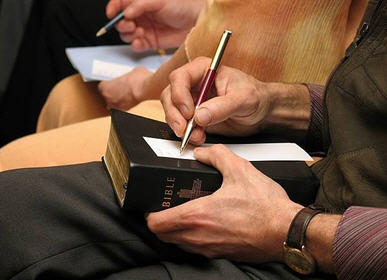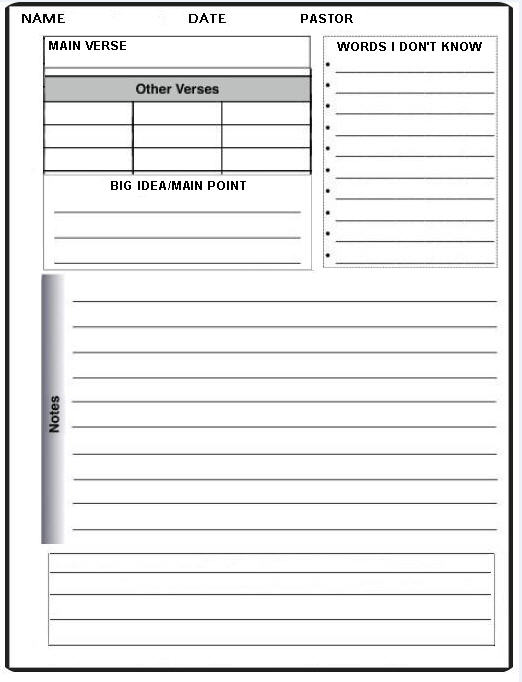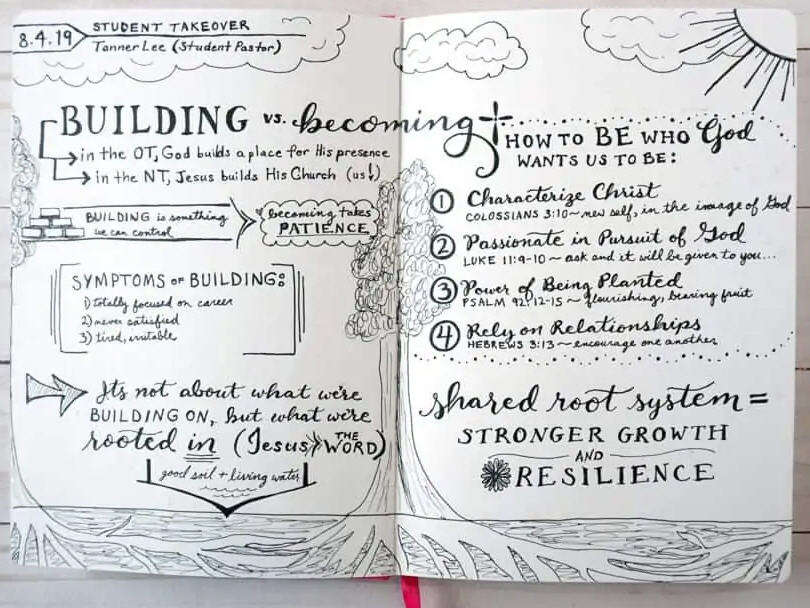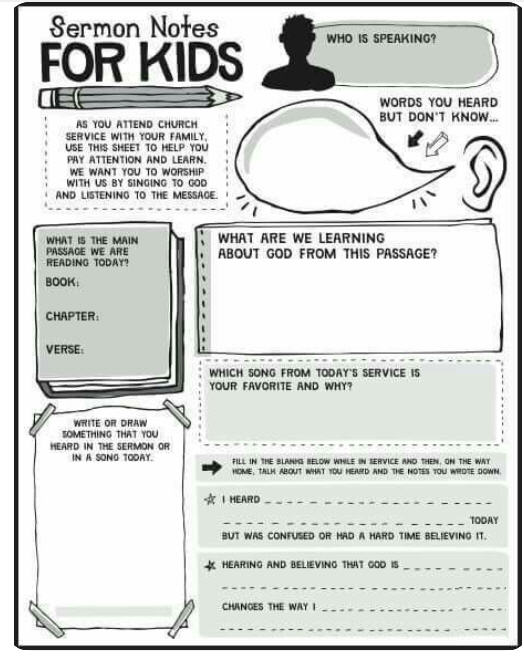THE BENEFITS OF TAKING NOTES DURING A SERMON OR BIBLE TEACHING

THE BENEFITS OF TAKING NOTES
DURING A SERMON OR BIBLE TEACHING
By Michael K. Farrar, O.D
Personally in my own life I’ve gotten to a point where I can’t listen to a sermon or Bible teaching without taking notes. Over the years I have found taking notes to be an enormous help for any serious student of the Bible and for anyone wishing to grow in their faith. Taking notes during a sermon or any Bible teaching encourages me to pay attention to what is being preached or taught, challenges me to seek ways to apply what is being spoken and improves my reading Holy Scripture in my own studies at home. Below are three benefits of taking notes whenever you are hearing the Bible being taught:
TAKING NOTES HELPS YOU STAY ENGAGED
TO WHAT IS BEING SPOKEN
If we are honest with ourselves, most of us have a difficult time staying focused while listening to Bible preaching or teaching. While sometimes the skills of the speaker or how they have prepared the teaching can sometimes be the cause, more often than not it is not the speaker that is to be blamed it is the listener’s ability to remain engaged in what is being spoken. In our culture most of us suffer from short attention spans.
Research is beginning to show that because our culture is so used to multi-tasking and having their minds go in numerous different directions; it’s difficult for people to slow down, think deeply, and intellectually engage on something for long periods of time. Current studies show the surprising reality that people who make it a habit to take notes not only stay engaged with a speaker, but also are able to digest what’s being heard better.
Even in an age dominated by laptop computers and personal tablets that help us organize notes and things to do, people are able to think through subject matters best by taking hand written notes. If you’re like me and love to be organized, you can’t help but to listen carefully as you anxiously await the ‘next point’ or note-worthy quote while listening to a sermon or lecture. Taking notes will definitely help you to remain focused on what’s being said in any teaching or preaching environment.
TAKING NOTES PRESERVES
A GOOD RESOURCE FOR THE FUTURE
How many times have you heard something in a sermon or class that you remembered something similar being said, yet in a different way? If you’re like me, this happens all too often and I’ve found myself wishing I’d written something down to consult back to for further study or just to be reminded.
By taking notes we not only store up a resource that we can go back to time and again, but create a kind of tracking of our own spiritual progress and learning as a follower of Jesus. In my own case, I keep most if not all of my notes and organize them by either topic, scripture passage or by date. True Christians desire to grow in their knowledge of the Lord and to love God with all of their mind (Proverbs 9:10, Matthew 22:37).
One other benefit may also be that when you take notes you can share them with other Christian friends and/or pass them down to your children and grandchildren. This can demonstrate an example of faithfulness to God’s church and His Word as one who committed themselves to deep study of the Bible and marked a life that never got tired of learning about the Lord.
TAKING NOTES HELPS YOU
TO KNOW THE WORD OF GOD
One of the main reasons I take notes is to ensure that what I am hearing and writing down is fostering my own spiritual education and edification. It assists me in being biblically faithful and correct as I live out my salvation and minster to others that God brings into my life.
Another benefit is that as I strive to study scripture well so that I might live to glorify the Father, Son and Spirit, taking notes during a sermon or teaching helps me rightly divide the Word for myself (2 Timothy 2:15) and helps me apply it to my life.
Bible interpretation and exposition is extremely important to me not only as I teach and minister to others but also as I help others improve and grown in their own spiritual lives. In Acts 17 Paul is ministering to a group of Jews who were interested in hearing more about Jesus and was eagerly listening to Paul and ensuring that what he was saying lined up with the sacred scriptures.
“The brethren immediately sent Paul and Silas away by night to Berea, and when they arrived, they went into the synagogue of the Jews. Now these were more noble-minded than those in Thessalonica, for they received the word with great eagerness, examining the Scriptures daily to see whether these things were so.Therefore, many of them believed, along with a number of prominent Greek women and men.” (Acts 17:10-12)
The moral of this text? Be a Berean! Check the Bible to ensure what’s being taught is correct. Be a discerning Christian who wants to know the truth and cherish it for all of its benefits to your soul.
Because of all of the reasons I have mentioned above, I would greatly encourage you to take notes during a sermon, small group Bible study or even in your own devotional times. If you have never done this, what better time to start than now? Give it a try to see if it helps you in any way.
BELOW ARE SOME GRAPHICS WHICH MIGHT GIVE YOU
AN IDEA OF HOW TO DESIGN YOUR OWN NOTE-TAKING PAPER.



SOME ADDITIONAL HELPFUL WAYS
TO SAVE AND USE SERMON NOTES
6 EASY STEPS TO MAKE THE MOST OF SERMON NOTES
Take notes during the sermon. It will help you consider and focus on what is being said. …
Store them in your Bible until you’re ready to copy them. Simple enough. …
Use a Journal Bible. …
Use a fine point pen. …
Read the passage again. …
Record the notes into your Bible.
Making your own notes helps transfer what you learn intellectually into your heart and your note-taking habit may also have benefits for others.
Proverbs 3:1-3, “My son, do not forget my teaching, but have your heart comply with my commandments; for length of days and years of life and peace they will add to you. Do not let kindness and truth leave you; bind them around your neck, write them on the tablet of your heart.”
Proverbs 7:1-3, “My son, keep my words, and treasure my commandments within you. Keep my commandments and live, and my teaching as the apple of your eye. Bind them on your fingers; write them on the tablet of your heart.”
A FEW MORE WAYS YOU CAN STUDY
USING SERMON NOTES
Look Up Cross-References of those scriptures you heard and wrote down.
Study the Passage Yourself.
Study Related Passages.
Listen to Other Sermons or Teachings on a similar topic.
Make notes for Weekly Study Prompts.
By taking notes we not only store up a resource that we can go back to time and again, but create a kind of tracking of our own spiritual progress and learning as a follower of Jesus.
True Christians desire to grow in their knowledge of the Lord and to love God with all of their mind (Proverbs 9:10, Matthew)
Below are three more benefits of taking notes whenever you are hearing the Bible being taught:
TAKING NOTES HELPS YOU STAY ENGAGED.
TAKING NOTES PRESERVES A GOOD RESOURCE FOR THE FUTURE.
TAKING NOTES HELPS YOU TO KNOW THE WORD OF GOD.
Luke 10:27, “’You shall love the Lord your God with all your heart, and with all your soul, and with all your mind, and with all your strength. ‘ The second is this, ‘You shall love your neighbor as yourself. ‘ There is no other commandment greater than these.”
Matthew 22:36-40, “Teacher, which is the great commandment in the Law?” And he said to him, “You shall love the Lord your God with all your heart and with all your soul and with all your mind. This is the great and first commandment. And ha second is like it: You shall love your neighbor as yourself. On these two commandments depend all the Law and the Prophets.”
Mark 12: 28-31, “And one of the scribes came up and heard them disputing with one another, and seeing that he answered them well, asked him, “Which commandment is the most important of all?” Jesus answered, “The most important is, ‘Hear, O Israel: The Lord our God, the Lord is one. And you shall love the Lord your God with all your heart and with all your soul and with all your mind and with all your strength.’ The second is this: ‘You shall love your neighbor as yourself.’ There is no other commandment greater than these.”